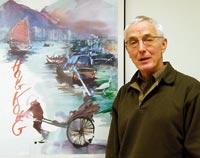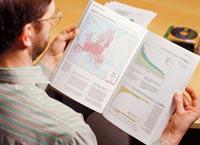David Gee: Politics and economy work in the short term; long-term science

What role does the European Environment Agency play in the European Union? Our main objective is to provide environmental information. Among other things, we address the demands of the European Parliament and the Commission. In the Member States we work for those responsible for the development and implementation of European environmental policies. It is about decision makers knowing all the relevant factors. In this way, decisions can incorporate environmental problems into legislation and economic policy to move towards sustainability. In addition, we work for other institutions and citizens.
Many times, to carry out these works, we conduct research and publish conclusions. We publish a report on the state of the environment in the European Union and propose criteria on current issues. On the other hand, we coordinate the work at European level and try to prevent the same tasks being carried out over and over again, making all the information available to users.

In addition, we have a series of medium/long term works, both from the creation of the organization and a posteriori, on which we have published numerous reports and books. These include, for example, work and reports on the precautionary principle (Late Lessons from Early Warnings: The Precautionary Principle 1896-2000).
What kind of message do you want to convey in these works? Among other things, we want to present some criteria to take into account the contributions of science in decision-making. This is what the precautionary principle does. According to him, the lack of total scientific certainty should not be an excuse for not taking action. This principle justifies political action in complex situations. Measures should be taken to avoid or reduce potential serious risks or irreversible damage to health or the environment, using the appropriate level of scientific evidence in each situation and taking into account the possible benefits and problems of adoption and non-action.
We believe that throughout history you can take out several subjects. The precautionary principle was first used in Europe in 1854 and I find it an interesting case. That year, in London, doctor John Snow proposed closing a source from Soho to combat the cholera epidemic. Many scientists disagreed with the proposal, as there was no evidence that water could cause the disease. However, the doctor observed a certain relationship between the consumption of this water and the disease. Despite the doubt of the relationship, the consultant thought that the consequences of taking action and being wrong were much more tender than the consequences of being right and not taking action, and the politicians listened to him. The relationship test was found years later. This fact is important in the history of science from the point of view of the precautionary principle, but not only that, but many consider it the beginning of epidemiology.
However, in most cases these "observations" were ignored, and throughout history there are many cases. For example, on the risks of asbestos XIX. At the beginning of the 20th century some scientists spoke for the first time. However, in 1998 this substance was banned in the European Union. By then they already knew it had harmful effects, but for a century it hurt thousands of people.

What factors influence decisions? The level of scientific evidence should normally be seen. Historically, unequivocal evidence has been requested in the field of policy for the adoption of measures and, in many cases, the immediate economic consequences also have a great impact. The influence of interests is sometimes clear. In short, politics and the economy work in the short term. Long-term science.
On many occasions, it has been found that scientific evidence has been misused or understood, and although politicians have considered that there was no danger, sometimes it has been seen that the risk was real. This is the case of the above-mentioned asbestos and also of mad cows. It must also be said that these kinds of "surprises" have hurt the opinion of scientists.
Such erroneous decisions can be serious. What makes us feel more innocent? What happens or take action and nothing happens? False negatives often arise, that is, although it is believed that something was not harmful, in the end it looks dangerous. In addition, false negatives are much more common than false positives, as we have seen in our research.
On the other hand, it is necessary to consider who pays the errors. The effects of false negatives are normally paid by citizens, and the most false positives usually by producers, hence there are so many difficulties to take action when there is no certainty. However, false positives can have long-term side benefits. When measures are taken to address a risk, for example, in the area of CO 2 emissions and climate change, although it was demonstrated that the effects of climate change are not so important, all work done to develop cleaner energy would be beneficial to reduce pollution, reduce consumption of non-renewable materials, etc.

But there are those who say that the science that uses the precautionary principle is weak… It is true that the strongest scientific evidence is not used, but what is most suitable in this case, solid or useful science? Science has three pillars: association, causality and mechanisms of action. To create a forceful science scientists have to know all three, but on many occasions there is no time in life. Decades can go from first to third. If a strong association is observed, the precautionary principle should be applied in politics without waiting for others, but moving forward simultaneously with the investigation.
When the degree of certainty is reduced, of course, the probability of mistake increases, which for many is worrying. However, total security does strong science but weak policies. Another problem today is that technology changes very quickly and, if the effects are long-term, it is difficult to demonstrate the harmful effect, but that does not mean that it does not occur. The example of asbestos is good and that is happening with GMOs.
This principle can limit innovations…
I would say it drives more innovations than it limits. This can cause there to be no innovation monopolies and can stimulate research on more than one way to fulfill a function or address a problem. In this way it is possible to avoid "surprises" on a global level.
Is the precautionary principle predominant in European politics? It should be done in theory, but it is not yet the maximum. It is mentioned in all documents and proposals, but it can be a mere political expression if no changes occur. Despite its progressive use, it has not yet been incorporated into the heads of legislators.

We are working under the primacy of the economic growth paradigm and environmental issues are not really internalized. Still, decisions are often made based on claims, rather than the researchers' proposals. To change the current model it can be of great help to show the public the details of scientific research, to agree on a model of dialogue and to interact with all stakeholders. On the other hand, the impulse of interdisciplinary science is also fundamental to improve its impact on politics.
Buletina
Bidali zure helbide elektronikoa eta jaso asteroko buletina zure sarrera-ontzian











